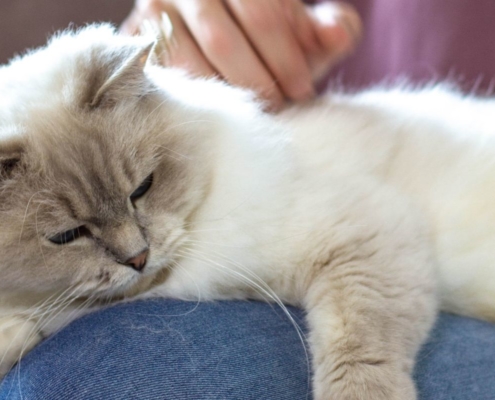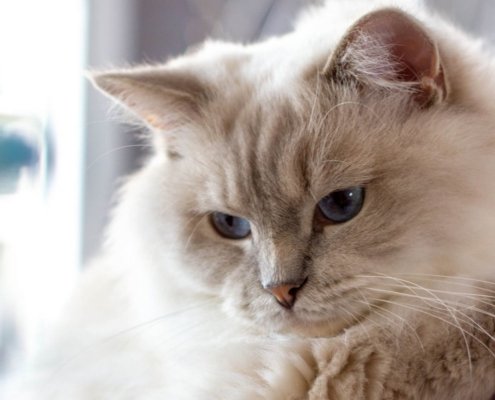Taking care of your senior cat |
nurturing a comfortable old age

nurturing a comfortable old age
When your cat gets older, the time has come to give it some extra attention and adjusted care. Take a good look at his needs and the signals he is sending to make sure you can give him a comfortable old age.
That depends entirely on the cat in question. It is actually not possible to indicate an exact senior age, and an owner often finds it difficult to make an estimate. Some cats are “of age” by the age of eight, while others are still young at sixteen. Did you know that, according to the Guinness World Record, the oldest cat lived to the age of 38 years and 3 months?! So some cats don’t feel old for a long time and want stretch their stay with their owner for as long as possible. If you want to know if your cat is “old”, it is best to observe your own cat closely to see how it is behaving.
As a cat gets older, it is more prone to health problems such as:
Chronic kidney failure in cats is quite common, especially in older cats. Unfortunately, the kidney failures are not discovered until late, which means that much of the kidney function has already been lost. It is therefore important to identify kidney failure at an early stage and support kidneys where necessary.
Joint problems are unfortunately common in adult cats, of which (osteo) arthrosis is most common. Osteoarthrosis is a condition where the cartilage of a particular joint deteriorates. Unfortunately, joint diseases cannot be cured. We can, however, take measures to reduce the complaints and slow down the progress of the condition. This includes an adjusted diet to make sure your cat gets the most suited nutritional package that meets its needs, and stimulate regular but dosed exercise. You may also decide to opt for additional (pain relief) treatment.
Dementia can also occur in cats at a later age. The cause of this lies in the nervous tissue of the brain. The symptoms associated with dementia are also seen in cats with severe renal failure and /or an overactive thyroid gland. It is therefore important that cats with dementia symptoms are properly examined by a veterinarian to determine whether we are indeed dealing with dementia and not with another problem.
There are several ways to keep the brain active at a younger age and to support a cat with dementia as well as possible. You may think of brain games, such as the use of a food puzzle.
For cats, and especially cats with dementia, it is important to keep their environment predictable for them and thus change as little as possible. So preferably do not rearrange your furniture often. If necessary, you can reduce the cat’s living environment a bit to increase predictability.
Your senior may become less active or may eat less. This can cause complications. Therefore, be alert and keep your cat fit. We give you a number of tips to keep your senior cat fit:
After a certain age, the cat becomes less active and some organs will no longer function optimally, which changes its nutritional needs. Then it is recommended to switch to a food that has been specially formulated for older cats.
Prins has special 100% natural high-quality crunchy kibble foods for senior cats that meet the adapted nutritional needs of older animals, such as Prins VitalCare Senior, amongst other.
 https://jakartapetfoods.com/wp-content/uploads/2020/08/Prins-jakartapetfoods-food-allergy-cat.jpg
800
1900
Maarten Smit
https://jakartapetfoods.com/wp-content/uploads/2020/11/LOGO-jakartapetfoods-website-header.png
Maarten Smit2020-08-31 21:09:202020-08-31 21:28:37Does my cat have a food allergy?
https://jakartapetfoods.com/wp-content/uploads/2020/08/Prins-jakartapetfoods-food-allergy-cat.jpg
800
1900
Maarten Smit
https://jakartapetfoods.com/wp-content/uploads/2020/11/LOGO-jakartapetfoods-website-header.png
Maarten Smit2020-08-31 21:09:202020-08-31 21:28:37Does my cat have a food allergy? https://jakartapetfoods.com/wp-content/uploads/2020/08/Prins-jakartapetfoods-food-allergy-cat2.jpg
800
1900
Maarten Smit
https://jakartapetfoods.com/wp-content/uploads/2020/11/LOGO-jakartapetfoods-website-header.png
Maarten Smit2020-03-26 10:08:582020-08-31 21:07:41How to get rid of skin problems with your cat
https://jakartapetfoods.com/wp-content/uploads/2020/08/Prins-jakartapetfoods-food-allergy-cat2.jpg
800
1900
Maarten Smit
https://jakartapetfoods.com/wp-content/uploads/2020/11/LOGO-jakartapetfoods-website-header.png
Maarten Smit2020-03-26 10:08:582020-08-31 21:07:41How to get rid of skin problems with your catPasar modern Intermoda
BSD City
Jl Raya Serpong
Tangerang
Banten, 15345 INDONESIA
WA: (0813) 8959 7585
E: info@jakartapetfoods.com

 Buying a puppy
Buying a puppy